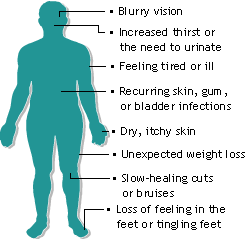
Learn the Warning Signs:
Diabetes Warning Sign: Thirst
People with type 2 diabetes frequently have no symptoms. When symptoms do appear, one of the first may be an increase in thirst. This is often accompanied by additional problems, including dry mouth, increased appetite, frequent urination -- sometimes as often as every hour -- and unusual weight loss or gain.Diabetes Warning Sign: Headaches
As blood sugar levels become more abnormal, additional symptoms may include headaches, blurred vision, and fatigue.Diabetes Warning Sign: Infections
In most cases, type 2 diabetes is not discovered until it takes a noticeable toll on health. One red flag is troubling infections, such as:- Cuts or sores that are slow to heal
- Frequent yeast infections or urinary tract infections
- Itchy skin, especially in the groin area
Diabetes Warning Sign: Sexual Dysfunction
Sexual dysfunction is common among people with diabetes. Diabetes can cause damage to blood vessels and nerve endings in the genitals, leading to a loss of feeling and making orgasm difficult. Other complications can include vaginal dryness and impotence in men.It's estimated between 35% and 70% of men with diabetes will have at least some degree of impotence in their lifetime. And about 1 in 3 women with diabetes will experience some form of sexual dysfunction.
Risk Factors You Can Control
Some health habits and medical conditions related to your lifestyle can increase the odds of developing type 2 diabetes, including:- Being overweight, especially at the waist
- A sedentary lifestyle
- Smoking
- A diet high in red meat, processed meat, high-fat dairy products, and sweets
- Abnormal cholesterol and blood fats, such as HDL "good" cholesterol lower than 35 mg/dL or a triglyceride level over 250 mg/dL.








Thanks Diabeteshealthcare. I will!
ReplyDeletein order to perform at a level that will allow them to succeed in specialized programs. garcinia cambogia and apple cider vinegar
ReplyDelete